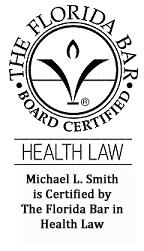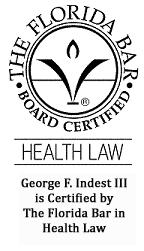Call: (407) 331-6620 or (850) 439-1001
Toll-free: (888) 331-6620



By George F. Indest III, J.D., M.P.A., LL.M., Board Certified by The Florida Bar in Health Law
Physicians who run into difficulty in obtaining certification by the American Board of Internal Medicine (ABIM) need to act to ensure that they properly exercise their rights to hearings and appeals. Because of the extremely serious repercussions adverse action by the ABIM might have on a physician’s career and livelihood, it is critical to approach this from an educated perspective. Competent, experienced legal counsel is always recommended to assist in such matters.
For example, in 2010, ABIM sanctioned 139 physicians for seeking out and sharing board exam questions with a test-prep company. The ABIM contended that this was a violation of the pledge test-takers sign before the computerized exam, and breached the ABIM’s copyright, contract and intellectual property laws. Those who were found to be involved received serious sanctions. Many doctors had test results disallowed, certification denied and were prohibited from attempting to become certified for up to three (3) years. Employers and potential employers had to be notified. Jobs were lost and offers were rescinded. Hundreds of thousands of dollars in income were lost by some physicians as a result.
Facing Possible Discipline or Sanction? Obtain Legal Counsel Early.
If you are a physician who receives a letter regarding improprieties or possible disciplinary action from the ABIM regarding your certification, it is important that you obtain legal representation at the very outset. Any statement you make to the ABIM, written or oral, can be used against you as an admission.
Tips for The Physician.
The following are some tips which may help prevent mistakes that can compromise a defense in such matters:
1. Retain the services of an experienced healthcare attorney who is familiar with such matters, immediately. The American Health Lawyers Association or your state bar association are good sources. Ask for a referral of a health lawyer who represents physicians.
2. Avoid e-mailing or discussing your situation on any listservs or blogs. You do not know how many places such communications may wind up, and your complete identity will be easily determinable. The specialty boards and other certifying bodies routinely monitor these.
3. Be completely candid with your attorney and reveal all facts, documents and prior communications that have occurred. Your attorney cannot effectively represent you otherwise.
4. Do not let any deadlines go by without requesting, in writing, via a verifiable method (not e-mail) that you have requested a review, hearing, appeal or other due process rights. “Verifiable” means sent by a method that can be tracked and receipt of which is documented (e.g., U.S. express mail with a return receipt requested, Federal Express, etc.).
5. Make sure any correspondence, documents, requests for hearings, requests for appeals, etc., are actually received (not mailed) by the ABIM by the date given. Keep documents proving this and follow-up.
6. If there is documented proof that you have actually been involved in a compromise of the examination, sometimes it will be advisable to admit this to the committee, produce any mitigating factors, apologize and propose a less harsh sanction. (Note: this will be contrary to what most defense attorneys would ordinarily recommend.) In the face of convincing evidence that you breached the rules, this may be the most reasonable and least damaging course to pursue.
7. Review any employment contracts, independent contractor agreements, provider agreements with third-party payers and medical staff bylaws (for hospitals at which you have privilege) with your attorney to determine if you are required to report this event.
8. Advise your employer (or prospective employer) of the situation and offer to do whatever is required to help alleviate any problems this causes to your employer.
9. See if your employer (or prospective employer) would be amenable to negotiating an amendment to the terms of your employment, including different duties, more supervisory, administrative or managerial duties, lower salary, etc., if necessary. Also consider requesting a postponement of starting date, leave of absence, sabbatical or other alternatives to full-time employment.
10. Explore charitable work and community service opportunities, such as service in community health clinics, volunteering in free/charity clinics and hospices, volunteering for overseas medical organizations such as Physicians without Borders, service in medically under served areas, and similar opportunities. This might also serve as a basis to convince ABIM to reduce the period for retaking the exam or becoming certified.
11. Every individual, case and situation is unique. You should consult with your attorney on every issue and follow his or her advice.
Tips for the Employer or Prospective Employer.
Here are some recommendations for the employer or prospective employer of a physician who has received notice from ABIM that he or she will not be certified:
1. Consult your healthcare attorney regarding the matter immediately.
2. If your contract with the physician requires him or her to be board certified (as almost any well-written contract will require) and it does not appear he or she will be able to meet this requirement, this will most likely be grounds to terminate or void the contract.
3. Attempt to obtain complete information from the physician on what his or her exact circumstances are and whether or not he or she is likely to become certified in the near future.
4. The easiest and least expensive resolution may be to terminate the physician’s contract, if the contract provides for this. The more complex and more expensive resolution may be to negotiate an amendment to the physician’s contract and to try to find alternative duties for the physician.
5. If it looks like you will be terminating or voiding the contract, start looking for a replacement physician right away. (The law requires you to mitigate your damages.)
6. If you have a medical group, use group numbers to bill third-party payers, and the physician is a member of your group or is a participating physician on the panel of the payer, review your provider contracts to determine if you must report this or take action to avoid having the payers’ patients treated by the physician.
Contact Health Law Attorneys Experienced with Investigations of Health Professionals and Providers.
The attorneys of The Health Law Firm provide legal representation to physicians, nurses, nurse practitioners, CRNAs, dentists, pharmacists, psychologists and other health providers in Department of Health (DOH) investigations, Drug Enforcement Administration (DEA) investigations, FBI investigations, Medicare investigations, Medicaid investigations and other types of investigations of health professionals and providers.
To contact The Health Law Firm, please call (407) 331-6620 or (850) 439-1001 and visit our website at www.TheHealthLawFirm.com.
About the Author: George F. Indest III, J.D., M.P.A., LL.M., is Board Certified by The Florida Bar in Health Law. He is the President and Managing Partner of The Health Law Firm, which has a national practice. Its main office is in the Orlando, Florida, area. www.TheHealthLawFirm.com The Health Law Firm, 1101 Douglas Ave., Altamonte Springs, FL 32714, Phone: (407) 331-6620.
Main Office • 1101 Douglas Avenue, Suite 1000, Altamonte Springs, FL, 32714
By Appointment • 37 N. Orange Ave., Suite 500, Orlando, FL 32801
By Appointment • 201 E. Government St., Pensacola, FL 32502 • Telephone: (407) 331-6620 & (850) 439-1001 • Telefax: (407) 331-3030
Medicare/Medicaid Audits, Health Care Law, Contracts, Hospital Privileges Hearings, Investigations, DEA Defense, Board of Medicine Defense, Fraud Defense, Administrative Hearings, PRN, IPN, Professional Licensing, Medicare/Medicaid Fraud Defense, Nursing Law, Compliance Plans, Hospital Law, Board of Dentistry, Board of Nursing, Board of Pharmacy, Board of Psychology, White Collar Crime, Pain Management and Pain Medicine Physician Defense, Pain Management Clinic Defense, Zone Program Integrity Contractor (ZPIC) Audit Defense, Recovery Audit Contractor (RAC) Audit Defense, Medicaid Fraud Control Unit (MFCU) Defense, Search Warrant and Subpoena Defense, Board of Psychology Defense, NBME Representation, U.S.M.L.E. Challenges, ABIM Representation, Medical Exam Cheating Defense…and more
Available in the following Florida cities and counties: Daytona Beach, Fort Lauderdale, Gainesville, Jacksonville, Key West, Melbourne, Miami, Ocala, Orlando, Pensacola, Panama City, Sarasota, St. Petersburg, Tallahassee, Tampa, West Palm Beach, Alachua, Baker, Bay, Bradford, Brevard, Broward, Calhoun, Charlotte, Citrus, Clay, Collier, Columbia, Dade, De Soto, Dixie, Duval, Escambia, Flagler, Franklin, Gadsden, Gilchrist, Glades, Gulf, Hamilton, Hardee, Hendry, Hernando, Highlands, Hillsborough, Holmes, Indian River, Jackson, Jefferson, Lafayette, Lake, Lee, Leon, Levy, Liberty, Madison, Manatee, Marion, Martin, Monroe, Nassau, Okaloosa, Okeechobee, Orange, Osceloa, Palm Beach, Pasco, Pinellas, Polk, Putnam, St. Johns, St. Lucie, Santa Rosa, Sarasota, Seminole, Sumter, Suwannee, Taylor, Union, Volusia, Wakulla, Walton, and Washington
By making this website information available for those who access it does not constitute doing business in or having a presence in any state or jurisdiction, nor does it constitute an advertisement sent to or a solicitation made in any state or jurisdiction. This firm is located in and maintains a presence in only those states where the firm maintains an actual physical office. Its attorneys are only admitted to practice in those states specifically listed on their resumes.
Available in the following states*: Alabama, Alaska, Arizona, Arkansas, Connecticut, Delaware, Florida, Georgia, Hawaii, Idaho, Illinois, Indiana, Iowa, Kansas, Kentucky, Louisiana, Maine, Maryland, Massachusetts, Michigan, Minnesota, Mississippi, Missouri, Montana, Nebraska, Nevada, New Hampshire, New Jersey, New Mexico, New York, North Carolina, North Dakota, Ohio, Oklahoma, Oregon, Pennsylvania, Rhode Island, South Carolina, South Dakota, Tennessee, Texas, Utah, Vermont, Washington, West Virginia, Wisconsin, and Wyoming
Disclaimer | Terms of Representation
The Health Law Firm logo shown above is a registered Service Mark of George F. Indest III, P.A. – The Health Law Firm, since 2007.
“The Health Law Firm” is a registered fictitious business name of and a registered service mark of The Health Law Firm, P.A., a Florida professional service corporation, since 1999. Copyright © 2024 The Health Law Firm. All rights reserved.